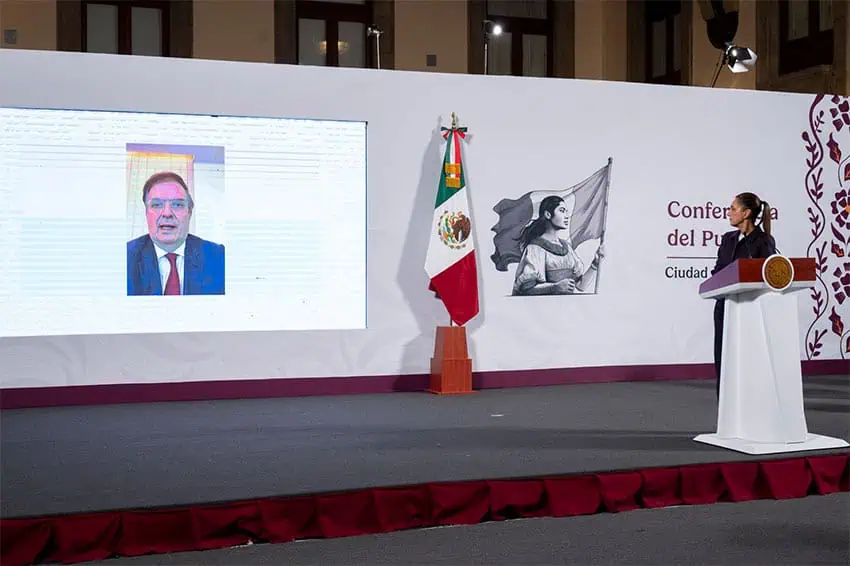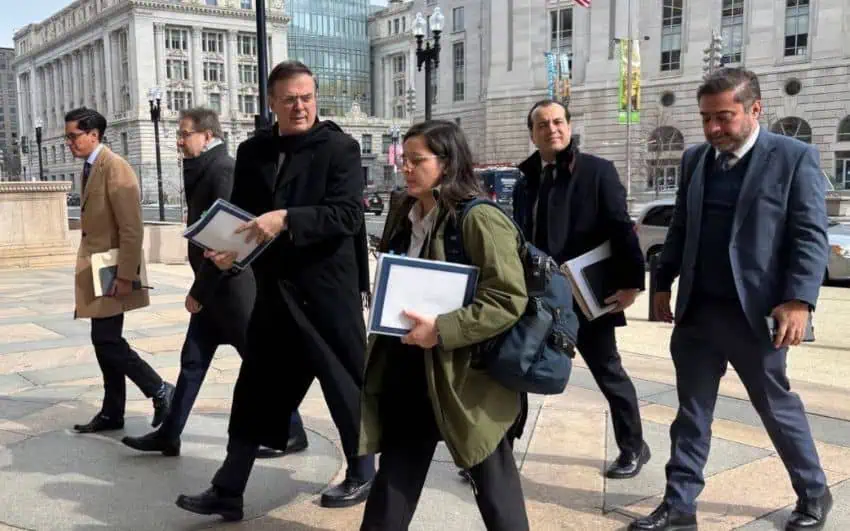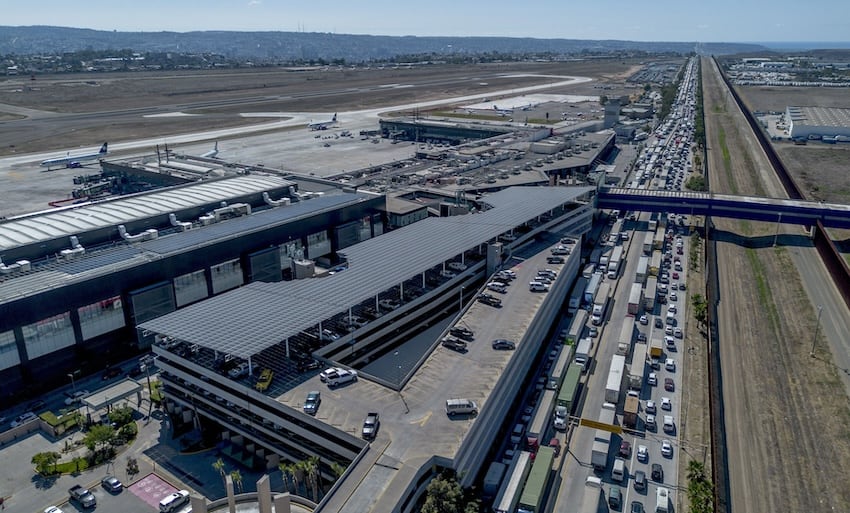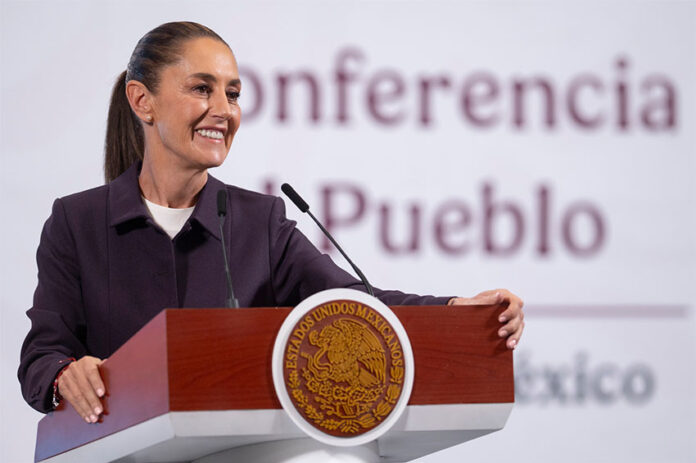President Claudia Sheinbaum’s Thursday morning press conference came just 16 hours after U.S. President Donald Trump announced he would impose a 25% tariff “on all cars that are not made in the United States” starting next week.
However, U.S. content in vehicles assembled in Mexico will be exempt from the duty, lowering the effective tariff on Mexican-made vehicles (See Mexico News Daily’s report here).

Economy Minister Marcelo Ebrard joined Sheinbaum’s mañanera via video link from Washington, D.C., where he has been discussing trade issues, including tariffs, with U.S. officials.
Here is a recap of his remarks with regard to the new auto tariff announced by Trump on Wednesday.
‘This is a major change to the trade system’
“Yesterday, as the presidenta already mentioned, President Trump announced … the decision to impose 25% tariffs on vehicles imported into the United States,” Ebrard remarked.
“This is a major change to the trade system in itself,” he said.
Ebrard highlighted that Mexico’s auto industry and auto parts industry are both “very significant.”
“… We export almost 3 million vehicles to the United States [annually] and we supply 40% of all the auto parts that are used here in the United States,” he said.
‘What we have to do is seek preferential treatment for Mexico’
After noting that he and other Mexican officials have met six times with United States Commerce Secretary Howard Lutnick, and on a number of separate occasions with U.S. Trade Representative Jamieson Greer, Ebrard made it clear what Mexico wants from its northern neighbor.
“If they’re going to change the system, if we’re going to go to a system of such high tariffs, what we have to do is seek preferential treatment for Mexico so that we have the conditions to protect jobs and the economic activity of Mexico,” he said.
“This, of course, has been a little bit difficult, as you can imagine, but thanks to the call President Sheinbaum had with President Trump, the door was opened to the meetings I just referred to,” Ebrard said.
Asked by reporters on Wednesday whether there were any conditions under which he would lift the auto tariff, President Trump said it was “permanent.”
Vehicles made in Mexico will get a tariff ‘discount’
Ebrard highlighted that the U.S. content in vehicles made in Mexico has increased in recent years.
“In the majority of the brands that are in Mexico, the [U.S.] component is now a more or less significant percentage,” he said.

Ebrard explained that vehicles made in Mexico will consequently get a “discount” on the 25% tariff announced by Trump.
According to Guillermo Rosales, president of the Mexican Association of Automotive Distributors, a vehicle made in Mexico for export to the United States has, on average, 40% U.S. content. The effective tariff on a vehicle assembled in Mexico with 40% U.S. content would be 15%. Of course, the tariff could be higher or lower than that level depending on the percentage of a particular vehicle’s U.S. content.
The fact that a lower tariff rate will apply to vehicles made in Mexico is “a very important point,” Ebrard said.
Mexican auto parts tariff won’t take effect on April 2
In a fact sheet, the White House said that “USMCA-compliant automobile parts will remain tariff-free until the Secretary of Commerce, in consultation with U.S. Customs and Border Protection (CBP), establishes a process to apply tariffs to their non-U.S. content.”
As a result, Mexican auto parts that fall under the North American free trade pact won’t face tariffs on April 2, Ebrard said.
It was unclear how soon the process to apply tariffs to non-U.S. content in auto parts would be established.
Ebrard said that he is engaged in talks with the U.S. secretary of commerce aimed at protecting Mexican auto parts from tariffs.
He reiterated that Mexico supplies 40% of all auto parts used in the United States.
“To say it more clearly, that means you can buy a vehicle made in the United States but it has 40% Mexican components,” Ebrard said. “So we said [to U.S. officials]: ‘How are you going to charge a 25% tariff on Mexican auto parts?”
The auto tariff can’t be charged more than once
Ebrard also said that parts that cross borders within North America several times during the automotive manufacturing process won’t be taxed each time they enter the United States.
“As I once explained in the [president’s] mañanera, … a piston [can] cross the border seven times. Imagine [the cost] if the 25% [tariff], or whatever percentage it is charged, seven times,” he said.

“It was already clearly established that this won’t happen,” Ebrard said.
The economy minister said that the tariff “discount,” Mexico’s desire to avoid tariffs on Mexican auto parts and the establishment of a rule preventing auto parts from being taxed on multiple occasions were the focus of his most recent discussions with U.S. officials.
“In summary, what we’re seeking in the end is that products made in Mexico are better priced than those of any other country, like Germany, Japan, South Korea or any other country that also exports to the United States,” Ebrard said.
“That is the preferential system that the president has asked us to organize,” he said.
In an ‘ideal world,’ there would be no tariffs
Ebrard said that in an “ideal world,” there would be no tariffs on trade, but he acknowledged that choosing to adopt a protectionist posture or not “is a decision for all the countries of the world.”
The economy minister also said that he has personally been treated “very well” by U.S. Commerce Secretary Howard Lutnick.
“Every week, he has welcomed me with pleasure, and he has understood a lot of the arguments we have presented to him,” Ebrard said.
‘Comprehensive response’ to US tariffs coming on April 3
Sheinbaum said that the government will provide “a comprehensive response” to the United States’ tariffs on April 3.
The U.S. has already imposed 25% tariffs on Mexican steel and aluminium, and on goods from Mexico not covered by the USMCA. The Trump administration also intends to impose reciprocal tariffs on goods from all its trading partners on April 2.
“We don’t want to give a response to each issue, but rather a comprehensive response,” Sheinbaum said.
“The first thing the people of Mexico have to know is that we will always protect Mexico — that is our responsibility,” she said.
“We have to defend the jobs that are created in Mexico, the jobs that exist and Mexican companies as well,” Sheinbaum said.
“… Of course, within the United States-Mexico-Canada Agreement there shouldn’t be tariffs,” she added. “That is the essence of the trade agreement.”
By Mexico News Daily chief staff writer Peter Davies ([email protected])
